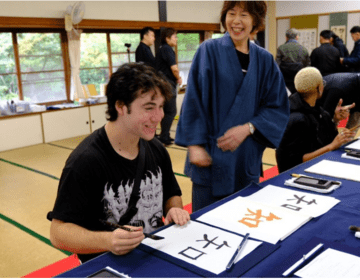9 Things to Know Before You Study Abroad in Tokyo
Studying abroad in a foreign country is exciting, but it can also be nerve-wracking to learn new customs and ways of doing things. Japan is the perfect example. While it’s filled with state-of-the-art technology, towering skyscrapers, and cosmopolitan restaurants, it’s a country rooted in ancient traditions and unspoken social rules. Here are nine common customs to know before you go.
Tipping isn’t required
Gratuities are not expected in any situation, including eating out, taking a cab ride, and getting a haircut. Don’t feel guilty - attentive service is the norm in Japan because of omotenashi, a deep-rooted cultural dedication to hospitality. Some restaurants will include a service charge, but if you leave money behind, no matter how much or little, don’t be surprised if servers, drivers, and others reject it or chase you down the street to return it.
Silence is golden
Japan is the perfect place to put on headphones and quietly relax, especially on buses and trains. From an early age, Japanese people are taught not to disturb or annoy others around them because personal space is limited in this highly populated city. The same is expected of visitors - keep conversations to a minimum and your voice quiet, especially since it will be more crowded if you decide to go on a summer program. Feel free to scroll through Instagram and Twitter, but avoid talking on the phone in crowded areas.
Just walk
Many Japanese people avoid eating and drinking while walking to avoid spills and messes. Even if you’re in a rush to make it to class, save your meal for the classroom. In Japan, it’s customary to sit and enjoy food and drink, not multitask.
Never litter
Japan is exceptionally clean. Most people take their trash with them and dispose of it when they get home since trash cans are placed so sparingly around the city. If you do find a trash can, make sure to separate your trash into the correct bin: paper, cans, plastics, and glass bottles. Other wastes should each have their own receptacle.
Take shoes off
Leaving your shoes on when entering someone’s house is a sign of disrespect. Some restaurants, temples, and dressing rooms also find it rude, so be sure to check for cubbies for your shoes or a pile of shoes by the door as a sign to remove yours. If guest slippers are provided, wear them. And if you’re wearing sandals to and from classes, throw a clean pair of socks in your purse or backpack for times when slippers aren’t available.
Hands to yourself
Public displays of affection like hugging, kissing, and holding hands are frowned upon in the public. Most Japanese people are quite reserved and modest when it comes to public displays of affection, especially older people. The younger generation may be more open, but to be on the safe side, keep your hands and lips to yourself.
Bow to others
When you meet someone for the first time, it’s customary to bow as a sign of respect. The duration and inclination of the bow is the most important. For example, the person of lower status bows first and more deeply than the elder or superior. Bowing is also used as a sign of gratitude. Students normally bow to their teachers in the beginning and end of class to greet and thank them.
Follow traffic rules
Never walk across cross the street aimlessly in Tokyo. The blaring horn of an oncoming car is best case scenario, with the worst being a trip to the ER. In really busy areas of the city, “No Jaywalking” signs indicate a nice fine if you’re caught. Best to wait for stopped traffic and spare your student budget.
Avoid pointing
Whether it’s with your finger or your chopsticks, never point at a person or an object. If you need to bring attention to something, use your words or a subtle hand gesture.
Follow these simple customs and you’ll find that it’s far easier to immerse yourself in the culture and in turn, be accepted as a friend, rather than an outside
Related Posts

The Heralds of Himeji
Written by Charlie Kleban Early on a morning in late October, I woke up to meet with the rest of my group so we could depart from our hotel on... keep reading

A Perfect Day Off in Kyoto
Written by Izumi Wada Hello everyone! My name is Izumi, and I am the Senior Program Coordinator at CIEE Kyoto. I moved back to Kyoto a little over two years... keep reading

Moments That Stay Forever
Written by Mie Huntley Hi, I’m Mie Huntley, a College Program Coordinator at CIEE Kyoto. I first joined the team in June 2025 as a seasonal staff member supporting the... keep reading
